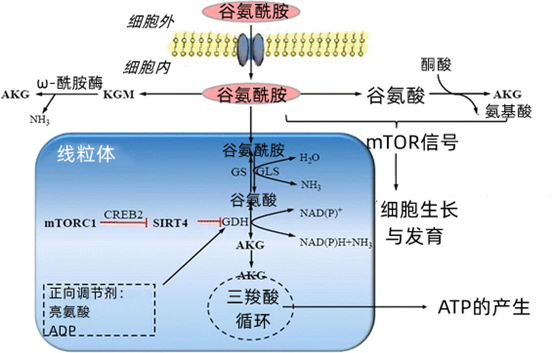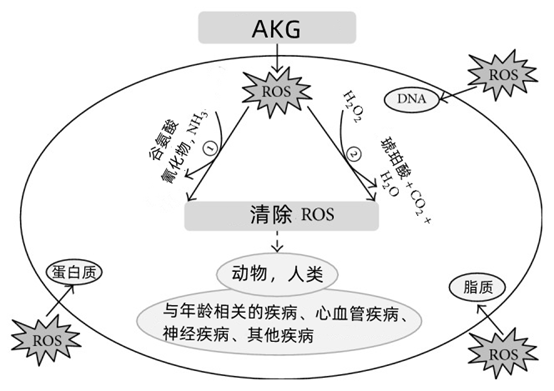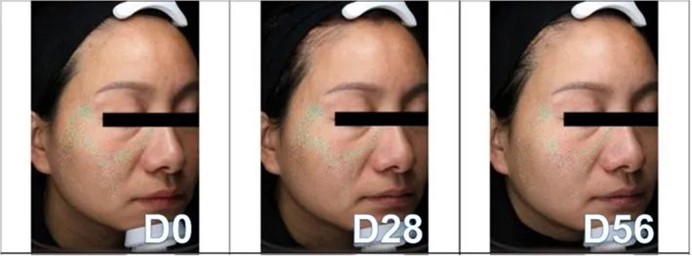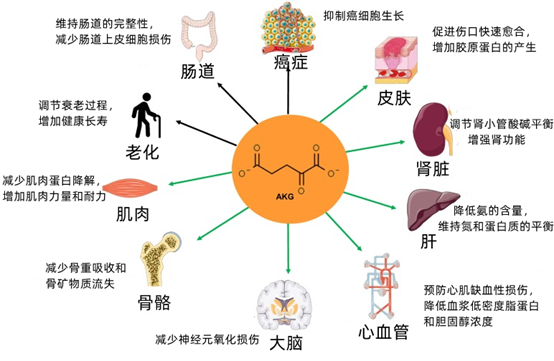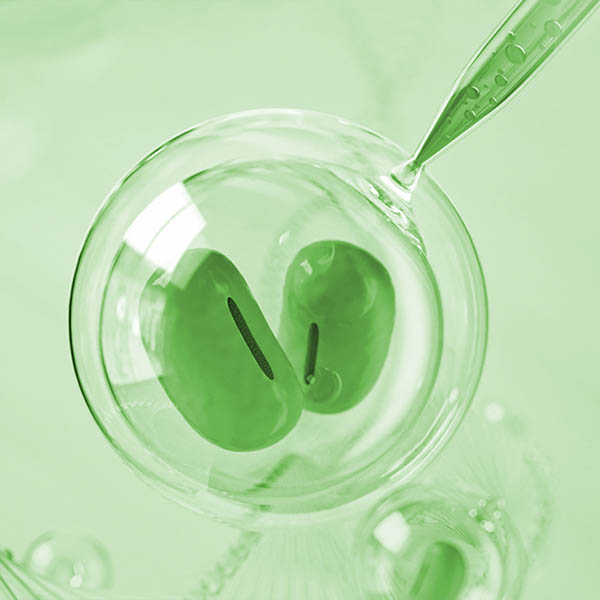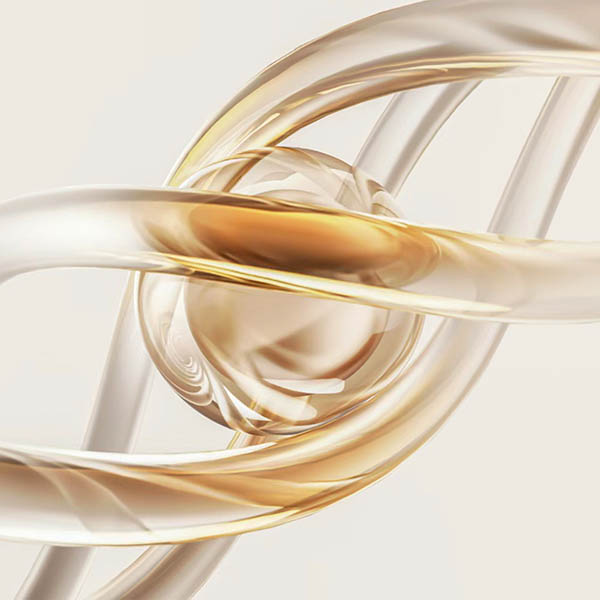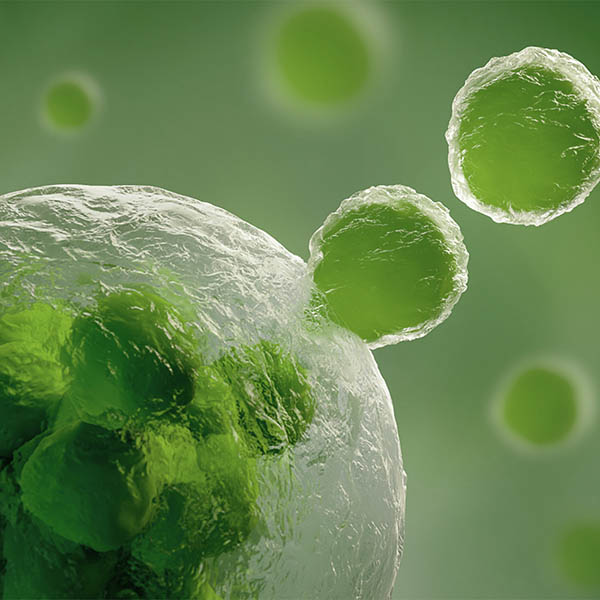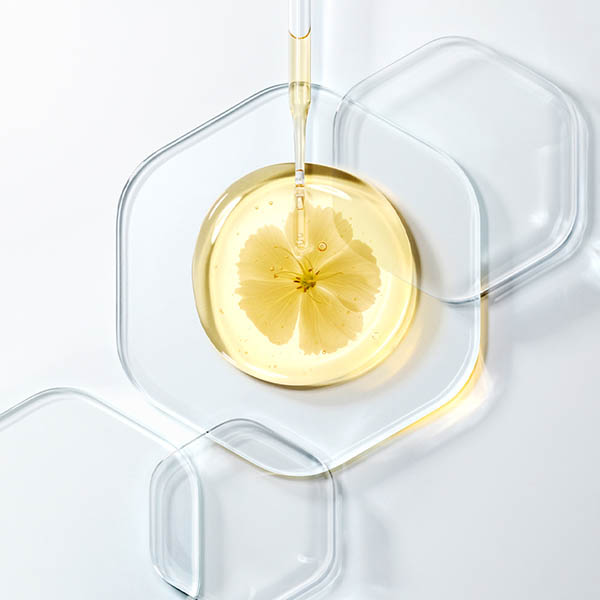AKG – Anti-Skin/Reproductive Aging, Antioxidant, Calorie Restriction, Whatever you can think of!
Since the last century, AKG (α-ketoglutaric acid) has been a well-regarded nutritional supplement for its effects in promoting bone development and boosting immunity. [1] With more and more research, AKG has also been found to have effects in reducing cytotoxicity and treating gastrointestinal diseases. [2]
Until 2014, Professor Brian Kennedy published an article in top academic journal “Nature”, revealing AKG’s new discovery – life extension by 50%. [3] Since then, the academic community believed that AKG may become the most anticipated and effective anti-aging supplement of this century. [4]
So, what are the certified anti-aging effects of AKG? What about safety?
1. AKG can be synthesised in the body, so why do we need to supplement it?
AKG is a precursor of ATP and a substrate for amino acids, it contributes in producing energy and synthesising essential proteins, thus subsequently improving mitochondrial function and enhancing cell repair abilities in the human body. [4]
With age, the body’s metabolic capacity gradually declines, and AKG can only act in cells for an extremely short time (less than 5 minutes), causing insufficient AKG levels – this can lead to problems such as decreased immune function, metabolic disorders, and increased risk of age-related diseases. [5]
It is necessary to supplement exogenous AKG to improve cell activity and prolong healthy longevity. [5]
2. There’s more than one way to resist ageing, AKG: Let’s go all the way!
It has been scientifically proven that AKG can activate the expression of longevity genes such as FoxO, DAF-16 and SIRT, inhibit the activation of inflammatory-related NF-κB signalling pathways, reduce the level of pro-inflammatory factors, and decrease the rate of inflammatory-related aging. [6]
In 2014, “Nature” published another review that confirms AKG’s effects on regulating metabolism-related reactions through simulating the effects of calorie restriction, demonstrating its potential value in anti-aging. [7]
No.1: AKG can be used to simulate caloric restriction
Cells contain a large number of ATP synthases in cells to promote energy metabolism. AKG can bind to the β subunit of ATP synthases, and reduce the production of energy in mitochondria, which is a marker of caloric restriction. [6]
When ATP content in cells become too low, the AMPK signalling pathway is activated, thereby inhibiting the expression of mTOR. [7] AKG can regulate the metabolism of senescent cells back to normal metabolic levels through this pathway.
AKG pathway regulation mechanism
As a recognised antioxidant of the past century, articles published in recent years further confirms that AKG can have anti-aging effects through its antioxidative properties in reducing age-related oxidative stress. [8][9]
No.2: AKG can be taken as an exogenous antioxidant and exert two types of antioxidant effects.
Target Free Radicals Directly
AKG can directly destroy the molecular structure of H2O2, reduce its oxidative toxicity, and weaken its ability to form more toxic free radicals. [10]
Enhances endogenous antioxidant defence system
Supplementation of exogenous AKG can activate the activity of enzymes involved in the antioxidant defence system. AKG increases the synthesis of heat shock proteins HSP60 and HSP90, improve cell activity, metabolic immunity, and help slow down the aging process. [11]
Antioxidant function of AKG and its applications
In 2020, the focus of AKG-related research began to shift to clinical. Published in a sub-journal of “Nature”, AKG is shown to have a significant effect on colon cancer in the elderly, bringing AKG’s anti-cancer and anti-tumour properties into light.
No.3: AKG has anti-tumour properties
Exogenous AKG supplementation suppresses the expression of HIF-1 α subunits (known to promote tumour cell differentiation) and reduces the ability of HIF-1 α subunits to link with proteins, thereby reducing the production of erythropoietin, erythrocyte and blood vessels, and inhibiting the growth and spread of tumour cells. [13]
In November last year, Professor Kennedy published an article in “Aging” presenting the results of a 7-years clinical trial. The results states that taking Rejuvant® (AKG dietary supplement brand) for an average of 7 months can reverse the age of subjects of approximately 8 years. [14]
No.4: AKG regulates epigenetic phenotypes
As an important substrate for demethylase, AKG can effectively reduce the methylation level of DNA and histones, reversing functional aging. [15]
However, if methylation levels are too low, it can interfere with chromatin function. Don’t worry, AKG also has an “ABS” system – while activating demethylase, AKG can break down excess demethylases through metabolites produced by the tricarboxylic acid cycle, maintaining the degree of methylation in the body at an appropriate level. [15]
AKG regulates epigenetic phenotypes
Today, AKG’s anti-aging achievements exist in many forms. In April this year, an AKG cream developed by a team of scientists from Wuhan, can significantly reduce facial skin wrinkles by 23.64% in only 56 days; it is shown to repair the damaged epithelial barrier and also good water-locking and moisturising effects. [16]
Wrinkles shown in green
In the latest clinical study in August, researchers also found that AKG can maintain the acid-base balance in smooth muscle cells attached to the testicles, providing a stable internal environment for sperm development and maturation. This shows AKG’s potential in improving male reproductive aging. [17]
3. AKG:How to Take? How Much to Take?
In the face of a wide range of AKG-related supplements, how to take and which one to take?
No.1: For Anti-aging, what should we do?
According to clinical statistics, AKG supplementation can improve muscle mass, osteoporosis, and have a positive effect on the treatment of neurodegenerative, cardiovascular, liver diseases and kidney diseases. [18]
The safe daily recommended dosage range given by the academic community is 3.6 – 6g, and the most effective routes of administration are: oral and intravenous. It is recommended to supplement intermittently. [19][20]
Moreover, AKG has also been found to be work in combination with calcium, sodium, arginine and ornithine dietary supplements to improve amino acid synthesis and reduce insulin levels. The synergy of a variety of supplements with AKG can result in a better anti-aging effect. [19]
No.2: Some minor side effects, that shouldn’t be ignored
Clinical data shows some negative side effects that should not be ignored. AKG can only be absorbed by cells of the gastrointestinal system, so it can cause absorption and metabolic stress to the gut, causing possible side effects such as nausea, bloating, vomiting and diarrhoea. [22] In this regard, there is still no effective measures to alleviate it, so the academic community calls for more clinical studies to find the best dosage of AKG for the human body as soon as possible.
References
[1] Dulaney, M. D., Jr, Brumley, M., Willis, J. T., & Hume, A. S. (1991). Protection against cyanide toxicity by oral alpha-ketoglutaric acid. Veterinary and human toxicology, 33(6), 571–575.
[2] Sheu, K. F., & Blass, J. P. (1999). The alpha-ketoglutarate dehydrogenase complex. Annals of the New York Academy of Sciences, 893, 61–78. https://doi.org/10.1111/j.1749-6632.1999.tb07818.x
[3] Chin, R. M., Fu, X., Pai, M. Y., Vergnes, L., Hwang, H., Deng, G., Diep, S., Lomenick, B., Meli, V. S., Monsalve, G. C., Hu, E., Whelan, S. A., Wang, J. X., Jung, G., Solis, G. M., Fazlollahi, F., Kaweeteerawat, C., Quach, A., Nili, M., Krall, A. S., … Huang, J. (2014). The metabolite α-ketoglutarate extends lifespan by inhibiting ATP synthase and TOR. Nature, 510(7505), 397–401. https://doi.org/10.1038/nature13264
[4] Asadi Shahmirzadi, A., Edgar, D., Liao, C. Y., Hsu, Y. M., Lucanic, M., Asadi Shahmirzadi, A., Wiley, C. D., Gan, G., Kim, D. E., Kasler, H. G., Kuehnemann, C., Kaplowitz, B., Bhaumik, D., Riley, R. R., Kennedy, B. K., & Lithgow, G. J. (2020). Alpha-Ketoglutarate, an Endogenous Metabolite, Extends Lifespan and Compresses Morbidity in Aging Mice. Cell metabolism, 32(3), 447–456.e6. https://doi.org/10.1016/j.cmet.2020.08.004
[5] Cynober, L., Coudray-Lucas, C., de Bandt, J. P., Guéchot, J., Aussel, C., Salvucci, M., & Giboudeau, J. (1990). Action of ornithine alpha-ketoglutarate, ornithine hydrochloride, and calcium alpha-ketoglutarate on plasma amino acid and hormonal patterns in healthy subjects. Journal of the American College of Nutrition, 9(1), 2–12. https://doi.org/10.1080/07315724.1990.10720343
[6] Chin, R. M., Fu, X., Pai, M. Y., Vergnes, L., Hwang, H., Deng, G., Diep, S., Lomenick, B., Meli, V. S., Monsalve, G. C., Hu, E., Whelan, S. A., Wang, J. X., Jung, G., Solis, G. M., Fazlollahi, F., Kaweeteerawat, C., Quach, A., Nili, M., Krall, A. S., … Huang, J. (2014). The metabolite α-ketoglutarate extends lifespan by inhibiting ATP synthase and TOR. Nature, 510(7505), 397–401. https://doi.org/10.1038/nature13264
[7] Filip, R., & Pierzynowski, S. G. (2008). The absorption, tissue distribution and excretion of enteraly administered alpha-ketoglutarate in rats. Journal of animal physiology and animal nutrition, 92(2), 182–189. https://doi.org/10.1111/j.1439-0396.2007.00725.x
[8] Salminen, A., & Kaarniranta, K. (2012). AMP-activated protein kinase (AMPK) controls the aging process via an integrated signaling network. Ageing research reviews, 11(2), 230–241. https://doi.org/10.1016/j.arr.2011.12.005
[9] Liu, S., He, L., & Yao, K. (2018). The Antioxidative Function of Alpha-Ketoglutarate and Its Applications. BioMed research international, 2018, 3408467. https://doi.org/10.1155/2018/3408467
[10] Zdzisińska, B., Żurek, A., & Kandefer-Szerszeń, M. (2017). Alpha-Ketoglutarate as a Molecule with Pleiotropic Activity: Well-Known and Novel Possibilities of Therapeutic Use. Archivum immunologiae et therapiae experimentalis, 65(1), 21–36. https://doi.org/10.1007/s00005-016-0406-x
[11] Vaiserman, A. M., Lushchak, O. V., & Koliada, A. K. (2016). Anti-aging pharmacology: Promises and pitfalls. Ageing research reviews, 31, 9–35. https://doi.org/10.1016/j.arr.2016.08.004
[12] Bayliak, M. M., Shmihel, H. V., Lylyk, M. P., Storey, K. B., & Lushchak, V. I. (2016). Alpha-ketoglutarate reduces ethanol toxicity in Drosophila melanogaster by enhancing alcohol dehydrogenase activity and antioxidant capacity. Alcohol (Fayetteville, N.Y.), 55, 23–33. https://doi.org/10.1016/j.alcohol.2016.07.009
[13] Krauß, D., & Gottlieb, E. (2020). Restraining colorectal cancer with αKG. Nature cancer, 1(3), 267–269. https://doi.org/10.1038/s43018-020-0044-4
[14] Wu, N., Yang, M., Gaur, U., Xu, H., Yao, Y., & Li, D. (2016). Alpha-Ketoglutarate: Physiological Functions and Applications. Biomolecules & therapeutics, 24(1), 1–8. https://doi.org/10.4062/biomolther.2015.078
[15] Demidenko, O., Barardo, D., Budovskii, V., Finnemore, R., Palmer, F. R., Kennedy, B. K., & Budovskaya, Y. V. (2021). Rejuvant®, a potential life-extending compound formulation with alpha-ketoglutarate and vitamins, conferred an average 8 year reduction in biological aging, after an average of 7 months of use, in the TruAge DNA methylation test. Aging, 13(22), 24485–24499. https://doi.org/10.18632/aging.203736
[16] Salminen, A., Kaarniranta, K., Hiltunen, M., & Kauppinen, A. (2014). Krebs cycle dysfunction shapes epigenetic landscape of chromatin: novel insights into mitochondrial regulation of aging process. Cellular signalling, 26(7), 1598–1603. https://doi.org/10.1016/j.cellsig.2014.03.030
[17] Yang, F., Zhou, Z., Guo, M., & Zhou, Z. (2022). The study of skin hydration, anti-wrinkles function improvement of anti-aging cream with alpha-ketoglutarate. Journal of cosmetic dermatology, 21(4), 1736–1743. https://doi.org/10.1111/jocd.14635
[18] Fucheng Dong, Wei Li. (2022). α-Ketoglutaric acid: a new chance for male fertility preservation, Life Metabolism, loac015. https://doi.org/10.1093/lifemeta/loac015
[19] Wu, N., Yang, M., Gaur, U., Xu, H., Yao, Y., & Li, D. (2016). Alpha-Ketoglutarate: Physiological Functions and Applications. Biomolecules & therapeutics, 24(1), 1–8. https://doi.org/10.4062/biomolther.2015.078
[20] Cynober, L., Coudray-Lucas, C., de Bandt, J. P., Guéchot, J., Aussel, C., Salvucci, M., & Giboudeau, J. (1990). Action of ornithine alpha-ketoglutarate, ornithine hydrochloride, and calcium alpha-ketoglutarate on plasma amino acid and hormonal patterns in healthy subjects. Journal of the American College of Nutrition, 9(1), 2–12. https://doi.org/10.1080/07315724.1990.10720343
[21] Filip, R. S., Pierzynowski, S. G., Lindegard, B., Wernerman, J., Haratym-Maj, A., & Podgurniak, M. (2007). Alpha-ketoglutarate decreases serum levels of C-terminal cross-linking telopeptide of type I collagen (CTX) in postmenopausal women with osteopenia: six-month study. International journal for vitamin and nutrition research. Internationale Zeitschrift fur Vitamin- und Ernahrungsforschung. Journal international de vitaminologie et de nutrition, 77(2), 89–97. https://doi.org/10.1024/0300-9831.77.2.89
[22] Miedema, H., Felle, H., & Prins, H. B. (1992). Effect of high pH on the plasma membrane potential and conductance in Elodea densa. The Journal of membrane biology, 128(1), 63–69. https://doi.org/10.1007/BF00231871


